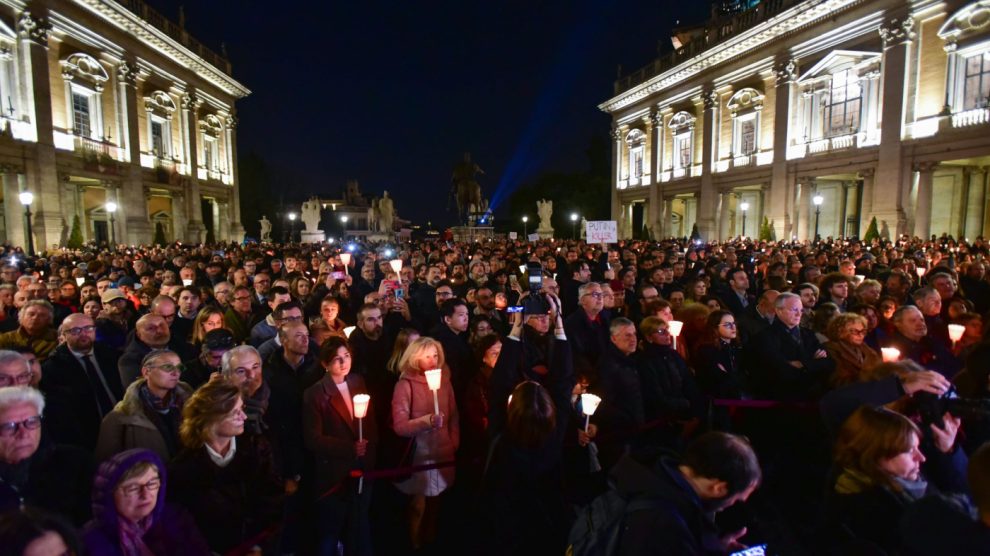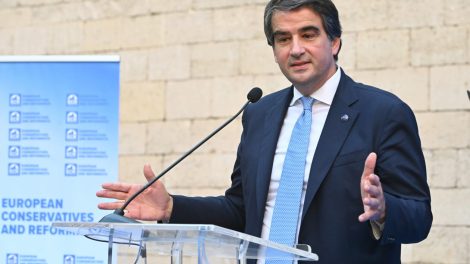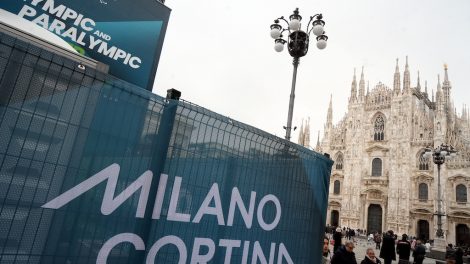Torches and flowers for Alexey Navalny. On Monday evening, Rome’s Capitol Hill lit up with politicians from across the political spectrum marching to mourn the Russian dissident, who died on Friday under unclear circumstances while in a Siberian jail and whose face was projected onto the Lower House of Parliament.
- The march was called by centrist opposition politician Carlo Calenda (Azione) and held by Rome’s major Roberto Gualtieri (Democratic Party). Representatives from all parties in Parliament and a vast crowd of citizens showed up.
- They were flanked by diplomatic representatives from all the other European Union countries, including France’s Martin Briens and Germany’s Hans-Dieter Lucas, as well as eight ambassadors from non-EU countries, such as the United States’ Jack Markell and British Deputy Head of Mission Eleanor Sanders.
Even the League was there, but… The party, which has historically been the closest to Vladimir Putin’s Russia, also chose to take part in the march. Like other party leaders, Matteo Salvini was not there in the flesh, but the head of the League’s senators, Massimiliano Romeo, showed up – and was harshly contested by citizens and politicians alike for the party’s refusal to hold the Russian president responsible for Mr Navalny’s death.
- “We don’t know what happened,” he insisted while conceding that “the thought goes to something very negative; that suspicion has come to us, too.” He then sought to put some distance between the Kremlin and the League: “On [Mr] Putin, we were wrong. But we were in good company. The whole West made wrong assessments. But now, the past is past.”
- His homologue from centrist Italia Viva, Enrico Borghi, recalled the existence of a protocol of collaboration between the League and United Russia, President Putin’s party – which was renewed in 2022, a few months after Russia’s full-scale invasion of Ukraine.
Deny & deflect. Earlier, the League’s second-in-command Andrea Crippa had refrained from “pointing fingers,” at least until “objective evidence” was analysed, while Mr Salvini himself later said that his party had taken part to the manifestation to demand “clarity” – but arguing that it was “up to the medics [and] the judges” in Russia to provide that.
- Senator Romeo responded harshly to those who contested him by recalling Minister Salvini’s past adulation of President Putin. He sought to return the accusation of hypocrisy to “those who say they are liberal and democratic and then want to ban the League from the square.”
- He then reacted to someone recalling the links between the League and the Kremlin by alluding to the allied governing party Forza Italia (FI) and the fondness between its late founder, Silvio Berlusconi, and President Putin.
- On his part, FI’s leader, Minister Antonio Tajani, stated outright that Mr Navalny had been “made to die” and argued that the blame, either directly or indirectly, lay with the Russian authorities.
Electoral signalling? While not showing up would probably have resulted in even harsher criticism, the League chose to walk its usual line of ambiguity with regard to Russia (although this time, by not explicitly condemning Moscow, it went even further than far-left forces in Parliament). Most recently, in January, Senator Romeo had tabled – and later rewritten – a motion in Parliament that explicitly stated that Ukraine couldn’t win against Russia given the lack of progress on the ground.
- That statement clashed with the government’s official line of full support to Kyiv, but it also highlighted the distance between the League and the rest of Parliament, with the June European elections fast approaching.
- Polls show that the League, which had won over 34% of votes in the 2019 European elections, risks falling behind partner-rival FI with 7% of preferences (while Prime Minister Giorgia Meloni’s Brothers of Italy is expected to get 25-30% of votes).





